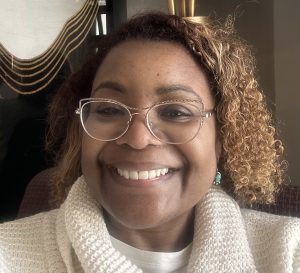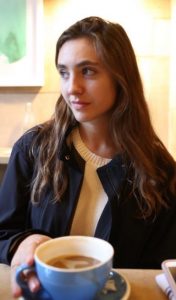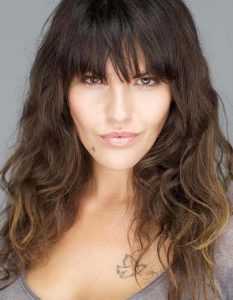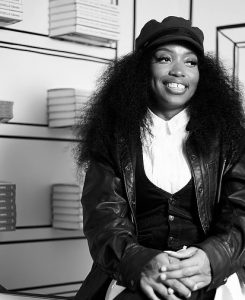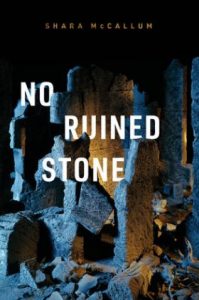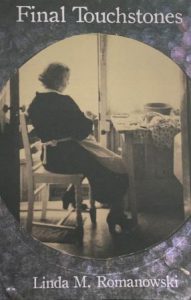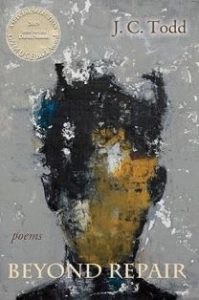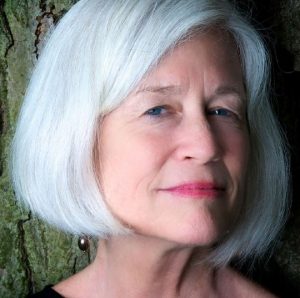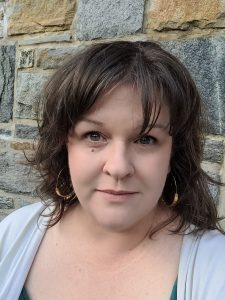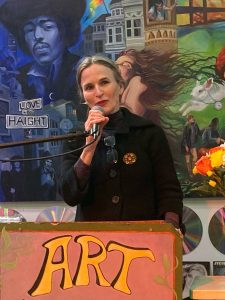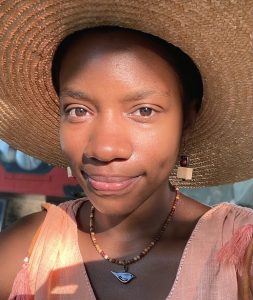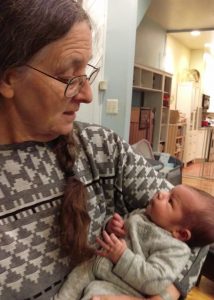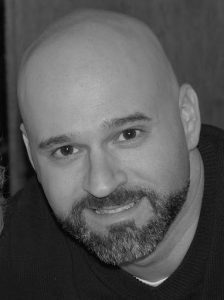
The fiery sun is losing its edges, a reddish gold singeing the sky. Fishermen pull in the day’s catch close by, shouting instructions to each other over the clamor of excited seagulls.
I am staring down at the yoga school built on stilts over the Arabian Sea—a sleek villa that offers rich foreigners a coastal break with a side order of spirituality and houses a hive of soul-searching beach bums who keep my aunt’s small cafe afloat. The same aunt who moonlights as the parents who left me behind, and for whom I bring to mind her dead children.
I drum my fingers on my lap to the rhythm of the gentle waves, waiting for a few yoga students to trickle into the cafe for Kerala fish curry. The usuals come in here at least once a day. They like to take the other meals in one of the fancier restaurants in the tourist town nearby.
The weekend has just started, and families are entering the luxury health resort across the street. I watch mothers holding babies in their arms and wonder what that might feel like. I listen to fathers give instructions to their children and imagine how I would respond. Then I lie face down in the sand and feel the fine grains chafe against my skin, afraid I don’t belong in my own life.
When nobody shows up even until nightfall, I lock the cafe and head to the tourist town where the circus troupe has been camped for one week.
Most of the performers are sleeping outside on the hot sand. Some are awake, talking, idling, playing cards. In one corner sits a carousel and next to it fiberglass elephants, Ferris wheels and mini bicycles. Making sure nobody sees me, I circle the structures repeatedly, touching the vintage canvas material of the tents and the circus wagons. I fiddle with the games, the puppets, and window displays lying around. When I turn around, I see the circus master observing me.
“Just a mirage,” he says.
I feel shame, as if caught thieving. I duck under the elastic cord holding up a tent and step away from the installations. How long has he been watching?
“A circus is a film is a book is a world is another life,” he says with a knowing look. “A mirage of a family for those who do not have one.”
Behind him, I see fishermen on handmade log boats vaporize into thick folds of water.
Late at night, when my aunt comes back from the city, her hands loaded with supplies for the beachside cafe, I wonder if I should tell her about my visit to the circus camp. When she sits next to me in the cafe kitchen, I notice how the ancient silver hoops have gouged out her earlobes. She uses the edge of her sari to wipe sweat off her face and a few drops fall on my feet.
I want to ask her if she has another photograph of my parents—I have folded my copy so many times it has started cracking, the image separating from the photo paper like dead skin. I want to ask her to tell me something new about them, anything that might resuscitate my fading memories of them. But I have learned to leave her alone as she retreats further into the black hole of her past.
She washes her face in the stainless-steel sink. “How were things at the cafe today? Anything special?”
“A little slow—” I begin.
“I am so tired,” she says.
I make her a cup of tea and do not ask her what a mirage means, just how I never ask her how my mother vanished during the 2004 tsunami or why my father left the next day, or if there was a link between the two events.
Then I start on the prawns that a surfer ordered earlier. Once they are pink and perfectly crisp, gently fleeced in the butter, with roasted garlic forming an aromatic base at the bottom of the pan, I plate them and carry them out to him. He is young, white, stationed in India to look for inner peace and Ayurveda. He also teaches Vinyasa yoga at the school on stilts and has a late dinner at the cafe every day.
“You never fail me.” He leans back in his chair. “Traveled everywhere in the world, Santiago, Madrid, Tokyo, New Orleans; never eaten seafood like this!”
How do I know he is telling the truth if I have never been to any of these places?
How did the circus master find the dark place in my mind to set up shop in?
We smile for the guests at the cafe, my aunt and me. Despite our tired eyes and hungry stomachs, we always do. We repeat stories we cooked with fragments overheard around the village, texts read in passing, memories, dreams, wishes; stories that would tug at the guests’ hearts and swell their lunch orders and gratuities. Sometimes, when my aunt is in a good mood, she sings for them songs she grew up listening to, songs about fishermen and mermaids and what would happen if the two got married.
I sing or joke with the guests only when my aunt is away; I don’t know why but I feel shy around her, like I am not good enough, like I will make a fool of myself, even though she doesn’t say anything when I attempt joviality, only turns around and leaves.
When she goes to the city, I twirl around the tables and balance multiple dishes on my forearms like I have seen servers do on TV. I show magic tricks to the children and praise the women’s clothes.
“The song is my husband,” I once hear my aunt tell a curious guest. “Always at my beck and call, always melodious, always on my lips.” She laughs. I stare in shock. Even though I know she is trying to please the guest, I suspect a true part of her has seeped through. She has never talked to me about her husband or if there ever was one. In their pictures her children look like nobody I have ever met.
That night, I dream about my aunt attending my parents’ wedding with her husband, blessing her younger sister with a love as glorious as hers. As if I’m directing a movie in my sleep, I control how the action unfolds. My mother asks my aunt to look after her future child. Only until we return for her, my father adds. But I am unable to play out my aunt’s response; no matter how many times I rewind the scene, her face remains elusive, her voice faraway.
Soon, some members of the circus troupe begin recognizing me. I manage the cafe during the day and when my aunt takes over in the evening, I spend my time with them. They say they like the pleasant expression on my face. I find it intriguing that my loneliness masquerades as pleasantness.
Two days before the troupe’s departure, Shirin, a dancer and a trapeze artist, and I sit together on the beach and watch the sun turn into the moon. The waves keep refilling the rock pools. The moon keeps burnishing the sand. I ask Shirin why she isn’t taking photographs of the sunset. Everybody who comes to this town does that. She says she has over five hundred sunset pictures from all over the world and she cannot distinguish one from another anymore.
When Shirin gets up to leave so she can finish packing her bags, I decide to return to the kitchen. It is surfing season and the beach is steadily spouting hungry people into the cafe. Shirin makes me promise I will join the farewell party the next day.
“My children loved the circus,” my aunt says when I mention the party to her that night.
I did not know that. I look at her face: stormy sea, big dark waves crashing on the shore. Her eyes: neat little banks of pain.
“Who sent the tsunami, do you know?” she asks me. “It did not belong here. Those were not its children to take,” she says.
The ground deforms under my feet, like the ocean floor does during a disturbance. This is the only time she has ever talked of the 2004 tsunami—grieving the children it stole from her. I learned of my own parents’ disappearance from a village elder. He said my aunt took me in the evening my father left. I was a year old, too little to remember.
I open my mouth to comfort my aunt, but words fail me, as always. I wish I knew her children, but not as much as I wish I knew my parents.
“I tried to save them. They did not know how to swim.” She is crying now, softly. “I failed my children.” I have never known my aunt to bawl like other mothers. Her life is an unending procession of low moans.
“You tried, Valiyamma. You did the best you could,” I say. “You made sure I learned how to swim.”
“We are good people, and yet the water came for us.” She turns to the window to watch the sea, the eternal object of her accusations. “Why?”
Suddenly I am not thinking about my parents or about the calamity that took them away. All I can think of is that my aunt will be forever unmoored from the present, and from me.
“I miss my children. And now I am so old, so tired,” she says.
We sit like that for a long time. We are two broken people trying to fuse into a whole family. But the fracture runs too deep.
We are shorelines on the move, continuously drifting together, before breaking apart in a never-ending cycle.
“What if she did not disappear?” I say to the thirteen-year-old kitchen boy the next morning. “What if he did not run away?”
For the last two years he has been washing dishes at the cafe in exchange for meals. For the last eighteen months he has been listening to me mourn my life. “You could go look for them,” he says.
“Look where?”
“Everywhere.”
“What about my aunt?”
“What about your aunt?”
“She has already lost her children.” I picture my aunt searching frantically for her little ones while I looked on from the sling crisscrossed around her back.
“Before taking you in or after?” he says conspiratorially. Then he shrugs. “You could be happy here.”
He has said these things before, but they sound different today. The circus is playing tricks with my mind.
I look in the mirror that night, combing my hair with my fingers. One day I plan to cut it short like my mother’s in the picture but for now I like how it reflects the moonlight. Or I could find her, and she could cut it for me while my father gives her instructions on how to. If my father could escape the tsunami, he must be an expert at everything. A warmth floods me but I am unable to decipher it. What does a thought without language sound like?
I step onto the party boat, bewitched by the lights and the laughter. The circus master finds me. He introduces me to his wife who smiles wordlessly, her eyes wrinkled around the corners.
Shirin hugs me from behind. “There she is!” she says, and I feel all grown up. Nobody has ever been thrilled to see me.
Then she takes me to the food counter and offers me dishes I have only ever seen on TV and never tasted. I accept generous helpings of everything and try to pretend I feel at ease. Someone laughs loudly at a half-told joke. Someone imitates a movie actor. Someone breaks into a song. Shirin excuses herself. “I hope you will be there to see us off tomorrow,” she calls out over the babble just before she disappears into the crowd.
I look over at silhouettes dancing on the upper deck. Stars change colors in the sky above as they issue starlight. Red-blue-red-blue.
The circus master’s wife brings me more food. “The boundary between family and friends is blurred here because we all live together,” she says. “We look after each other.”
“Are there vacancies?” I say, surprising myself, feeling like the jellyfish in the water below that float to wherever the current brings them.
“We’re always looking for performers with a strong stage presence,” she says.
I take the long way home, my ears still ringing from the loud music. Back at the cafe, a few pots and pans are waiting to be washed. I mix water in baking soda and apply the paste all over the bottom of a dark skillet. I scrub the burnt copper with an old rag, releasing the scent of stale garlic. Then I sit down on the floor and imagine the beach cradling a lone boat dancing in the frothy tug of the Arabian Sea.
The engine booms. After four weeks in the tourist town, the circus boat is ready to depart. I have to make a decision. It is now and forever, or never and what if.
I look at the flimsy wooden fence, waving gently. Then, at the meandering lanes beyond the fence, leading to hookah bars on one side and indie music lounges on the other, before connecting to the state highway.
Excitement bubbles on the boat. Hysteria of the beginning, panic at the letting go. Shirin hops on, but not before looking questioningly at me one last time.
The cafe door continues to rock on its hinges. The milk needs to be boiled. The table covers with prints of apples, oranges and strawberries need to be set out on surfaces crammed with coarse sand. The radio needs to be tuned to the local beach station. The coconuts need to be grated for Malabar chicken curry that needs to be cooked at noon. The Gods need to be freshened up and appeased for a hopeful day of business.
I close my eyes for a last-minute sign. Nothing. I walk to the boat. Then I stop, dash back to the cafe, lock the door without looking inside, run back to the boat and climb aboard. Navigation lights come on as I begin my new life.
It has been over a month in the circus and yet I have not spotted anyone in the audience who could look like my mother or my father. As a magician’s assistant, I hold props that I shift onto and off the stage, imitating a joyful character wholly unlike myself.
Shirin and I spend a lot of time together. She introduces me to all her friends. When we are alone, she talks a lot, as if in a hurry to tell me everything. Sometimes I try to narrate stories of my own, but I have so few. I embellish the actions of the cafe regulars, of the people who vacationed at the hotel and of those who passed through the yoga school, but I always feel less worldly, my stories less sophisticated.
She is an aerial wizard, moving like she is drawing a delicate pattern in the air, spinning midair with perfect grace. She tells me her family enrolled her in the circus without telling her. At the age of twelve, she lost her balance and fell backward while performing on a wheel suspended thirty feet above the ground.
She says she picked herself up, waved to the crowd and went back to her room to read a book. She tells me she likes historical fiction.
“Don’t you blame them for the accident?” I say to her in Siam Reap.
“I did, not anymore. You have to forgive your family one day, release the past to make place for yourself,” she says.
I have learned that circus mealtimes offer some of the only opportunities to talk to other human beings, so I eat with people from all over the world as they exchange stories. Most stories start with the old joke about running away and joining the circus.
Sometimes I watch mothers playing with their babies or listen to fathers narrate stories to their children. When the images of all the happy faces get too overwhelming, I hide in the bathroom.
“Fear is natural, but possibly irrational. Safety nets remove fear,” my acrobatics trainer says.
I agree. I found things like handstands and backflips scary when I was new. The trainer eliminated the fear by using pirouette bails and foam pits.
“Once you recognize your fears and learn that the risk is minimal, you can unlock your true potential,” she says.
I disagree. The more I see my fears, the more they tighten their fist in my throat, revealing a ghost that trails me everywhere no matter how hard I try to banish it back to my past. It feels as though I am a dedicated observer of events happening in my life, only to realize later that I am never a part of my own memories unless the ghost is also in the frame.
Although I had befriended a few members of the troupe back home, I am subdued around them. When they gather for drinks or games, I observe them quietly, sometimes laughing at inside jokes I do not understand so they do not think of me as foreign.
A few older people enquire suspiciously about my past life—dissatisfied no matter how I respond—but most others try to be familial, the men paternal, the women maternal. It rings false. My parents are impossible to replace, despite the fact that I never knew them. Plus, I prove unsuccessful in performing the part of a child. I do not know how to. Nobody ever taught me.
Some younger ones invite me to join their cliques where I struggle to act like them, never feeling like a good fit for those around me. Even the friendless and the family-less heighten my uneasiness. I want to tell them my innermost thoughts and fears, but I do not know where to begin. I want to feel attached to them, but I miss the intimacy I shared with the sea and the wind. I have learned that I am one of them and yet I am not. I am that leftover fish at the back of the circus refrigerator that the main cook always buys and forgets about.
Eight weeks since I joined the circus and Shirin is always busy now. Her stories have dried out, suddenly and with no warning. Has she tired of me? When she does approach me, I avoid her in resentment. Fever, I say. Or, late for practice. She never tries to make me stay, never adjusts her own day for me. I cannot remember if she was always like this and I never noticed, or if she has changed now. I am reluctant to approach her friends without her. What if they reject me? So, I wander the circus grounds alone, naming all the props and inventing lives for them. My heart races when someone catches me doing that. I try to tell myself I belong here as much as they do, but I am unable to believe it.
I pick a fight with my tent-mate in Cebu City, blaming her loud breathing for my lack of sleep. She apologizes, then defends herself. The next day she calls me crazy, and points at me when around her musician friends in the dining hall. I storm out without eating as if that would make any difference to their lives.
The circus master makes it a point to smile when he sees me, but it happens rarely. Once, when he has a moment to spare, he pulls a chair next to mine and says his life is cluttered with small worries. He says he admires how I look at things as if I’m seeing the world for the first time. I can see he is being kind, but his words make me sad, because they tell me that on the day of our first meeting, he had read his own mind, not mine. If he had read my mind, he would know that I see everything as if for the last time.
The circus has begun intimidating me. I feel like a trespasser here, visiting other people’s lives, uninvited. Like a stranger trapped in an alien body, inhabiting a reality that is not hers, deceiving the whole world.
The kitchen boy said I would find my parents if I looked everywhere; why haven’t they shown up yet? I want to run away.
Just when my thoughts look ready to collapse under their own weight, my trainer introduces me to Samar, the star acrobat who presents death-defying acts to adoring crowds, and I feel my head spin. His grey eyes remind me of warm sunlit sand. His calm voice evokes the village fishermen’s nightly song. Meeting him is like tripping over something and falling into the deepest hole on the Earth. Everything feels right again.
I start watching him all the time, deliriously, keeping a distance so he does not notice. While he is rehearsing his act, I pick up cleaning duties in the practice hall. I start going for early morning jogs and late-night strolls around his tent and lose a lot of weight. In Singapore I am convinced I love him. Is home an end point or where one starts from?
I ask my tent-mate where Samar is from, and she says she is not sure. He has been with the troupe since he was a boy of two, left in a bundle next to the circus master’s tent at night, not crying, just waiting to be picked up and trained to be a circus performer.
I offer to cook a meal for the whole troupe and, as expected, Samar seeks me out to offer compliments. We start talking regularly.
“As a child I learned all kinds of music, singing and acting to hone my craft,” he tells me in Makassar. We are seated among pots and pans in the moving kitchen van, shelling and eating peanuts, with him doing most of the shelling. Every now and then, the van goes over a speed bump, and we fly, our heads hitting the ceiling, the shells sticking to our clothes and hair, the pots clattering and knocking against each other. Each time that happens, we go quiet for a minute as if an announcement might follow, and when nothing happens, we clean our hair and clothes and go back to eating and talking.
That evening he casts a spell on the audience with his perfect acts of balance and flexibility. I feel my face burn.
I walk up to him after the show and before I can say anything he reads my feelings. Afterwards, we lie in an open circus wagon, and he kisses me for the first time. I close my eyes and feel his mouth brush against mine. From the stories told by village elders I know I shouldn’t be doing something like this before marriage, and yet I urgently feel I should be storing this feeling in my mind forever.
That night I dream that the two of us are surfing in the Indian Ocean long before the tsunami altered its temperament. We paddle out for glassy waves breaking over a rock shelf as the moon melts over our heads like a candle.
I have been in the circus for three months. Samar and I talk about life outside, which means I speak, and he pretends to listen. He is a circus person like he is a man or like he is tall or like he hates milk. It is a fact.
“Is this what you want our kids to grow up doing?” I ask him, only because I want to say ‘our kids.’ I pinch my cheeks secretly because I know he likes them flushed.
“Our imaginary future kids might be stronger than we think.” He laughs.
In the end, I cajole him to try life outside the circus, which means I lock eyes with him, and he smiles before looking away.
“Will you come find me?” I say in Hanoi, the wind whipping across my face.
“I will come find you,” Samar tells a star in the distance.
I look up at the star and the vastness overwhelms me. The sky appears ready to unleash a torrent of asteroids.
It suddenly feels as though I have arrived at a secluded house that no one invited me to and now I have to stay. I feel afraid while walking down long deserted corridors. Before I get over the first terrifying shadow, I find another one to fear. A lifetime passes but I never manage to work out why I am endlessly afraid.
The circus camps by the coast again, this time with me as an insider. In Da Nang, I walk out into the stray sun and reach the My Khe beach. As foamy waves rock me like a baby, I drift off to sleep on the smooth sand. Golden light squats on me.
Later, I watch my shadow grow and fade under the setting sun. Though the water is breathing life into my body, I cannot drink a drop. Light is converging on the ancient silver hoops in my mind. The blurred ghost is slowly coming into focus. Holding my waist so I can keep my head above the water, fashioning fictional mermaids with long hair like mine. I want to call my aunt and ask her if she misses me, but I do not. I am afraid the answer might be no.
“There is a path that leads back to her,” the waves say.
I shake my head. “Whatever I run behind, runs away from me,” I say.
“You keep running away because you are convinced you do not belong anywhere.”
“No!” My screams are towering storm waves, crashing into the rugged coast and churning high into the damp air.
I brush my hand against an umbrella-shaped jellyfish washed up on the shore. It is dead, and yet it stings me.
“What is a mirage?” I ask Samar that night.
“You,” he says.
A week later in Bangkok, I gather the nerve to walk faster than the rest of the troupe until I am out of sight. My thoughts are stuck in a junkyard like a rotting old fishing boat. My fear is not that if Shirin and the others see me escaping, they wouldn’t let me go, it is that if they see me escaping, they would let me.
The coastline stretches before me, waves rushing to the seashore like playing children, wearing out and tumbling over. Behind me sprawls the bustling night market, where the day’s catch—fresh lobster, prawns, clams, and whole fish—is displayed on ice. Recent rain lies on my path like beads. Families stroll around, skipping children, smiling parents. Backpackers sit in a circular arrangement of black plastic chairs, exchanging tales and preparing for their next adventure in Seoul and Singapore, or further down the Pacific in Sydney or Adelaide. Disco lights flash from clothing and footwear stalls. Red-blue-red-blue.
I want to call Samar and ask him if he misses me, but I do not. I am afraid the answer might be yes. So, I sit down next to a man selling banana sweets and think about my aunt. If I go back to the cafe, I will become her in fifteen years—sitting on the beach, near the reef, listening to the chants from the yoga school during the day and to the roars of the raucous waves at night. Going to the city every month to escape the listlessness of the beach, to escape the people who couldn’t stop talking about how they were escaping the cities.
It is that time of the day when the sun looks like a jar of honey. I use most of my money to buy a cheap phone and a temporary calling card. Then I take a train to Ayutthaya where I sit among the restored ruins of Wat Maha That and call my aunt. I remember her number by heart.
The phone rings several times. My aunt’s voice comes on the other side just as the last few tourists leave the temple area and the bricks change color from a burnt orange to a deep red.
“You called,” she says. She must be sitting outside the cafe, watching the lonely beach rise from lacy waves.
“How could I not?”
“I sent in the annual donation to the orphanage a week early so they could cook a feast for your birthday this year.”
“The children must have really enjoyed it,” I say.
“The director sent me a card signed by many of them. I wish you could read the messages.” Her voice is even like the sea’s surface on a calm day.
“I am in Thailand.”
“My children always wanted to travel the world.” This time, I am not jealous. This time, the invocation of her children comforts me, as if I am fulfilling their wishes.
“And how about you?” I say.
“I am tied to the water. I can never leave it.”
“You won’t have to, Valiyamma.”
I hear her shift in her chair. She pauses only briefly before she says, “Will you take me to the circus if I come and meet you there?”
Astha Gupta is a semi-finalist for the 2022 Marianne Russo Novel-in-Progress Award presented by Key West Literary Seminar and a fiction finalist both for the 2021 Porter House Review Editor’s Prize (chosen by Yiyun Li) and the 2020 Tucson Festival of Books Literary Awards competition. Her writing has received support from The Hambidge Center, The Sundress Academy for the Arts and The New York State Summer Writers Institute, and was nominated for the PEN/Robert J. Dau Short Story Prize. She holds an MFA in fiction from the University of Massachusetts Amherst where she was an MFA Fellow and won the 2021 Deborah Slosberg Memorial Award in Fiction. She lives with her family in Ann Arbor, Michigan.
